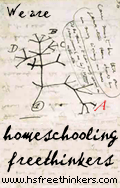Here is an excerpt of a note from Becky in Alberta too big to fit in this post's comments section:
If anything, I think one of the best ways to encourage independence in our kids IS to live an old-fashioned family-centered lifestyle, especially if you think parents rather than peers are the best teachers. Maybe it's because we live on a farm (though in my case that's been so only for the last 11 years; before that it was apartment living in NYC, with a few detours in Vermont and DC) and there are more than enough jobs around here that the help of even the youngest kids is appreciated, but I've often thought that one of the reasons that so many North American kids seem to be at loose ends is that they no longer feel as if they're part of a family because they don't feel needed by their families. Most kids today don't make much of a contribution to the daily goings-on; I don't know how many times I've heard another parent say, "Oh, Brittany has so much to do between school, homework, and extracurricular activities that I couldn't possibly have her do chores around the house." One hundred years ago, not only did a lot of kids get their chores done before walking or riding great distances to school, but their help was invaluable to the family's well-being. I'm not talking about using kids as hired help -- and certainly I've heard some, um, redneck adults in Alberta accuse hs'ing farm families for keeping the kids home specifically to help with the chores (though as I tell any critics, our kids do chores AFTER they've done their Latin lol) -- but participating in the daily rhythms and activities of a family's day-to-day life.
That closeness as a family, with everyone working together for the common good (sort of a microcosm, really, for when we send them off, as fully, uh, fledged citizens), is powerful stuff. It gives even the youngest kids a sense of purpose, a sense of belonging, a sense of accomplishment and the knowledge that way before attaining adulthood they are invested with important responsibilities affecting their parents' and siblings' well-being -- that externally-imposed "self-esteem" (ugh) can't hold a candle to any of that. My 4.5yo son's favorite job (though tellingly at his age he thinks of it more as fun than work) is washing eggs and putting them in cartons. Yes, he broke a few at the beginning, but he does a dandy job now, and even likes to stack all the cartons into what he calls the Great Wall of China. Some chores AND some history!
Nowadays the idea of independence means being able to send your two-year old off to daycare or preschool too many tears, shipping the older ones off for seven weeks to sleepaway camp when they've finally reached the minimum age, or having the various family members heat up a bite to eat in the microwave before taking off in four different directions every evening. For my husband and me, independence is knowing that when the time comes for them to leave our house (and yes, they *will* be leaving), my kids will be able to think and do for themselves.
I know this argument seems counterintuitive, but then I think of all those who kept asking if we didn't think that the kids would grow up spoiled or "too attached" when I continued to breastfeed beyond the first month, didn't dump the kids in daycare after six weeks, and carried each of them around in a Baby Bjorn (oh how I loved that
contraption) for the first year. Lo and behold, I didn't have kids who cried whenever they momentarily lost sight of Mommy or continued to demand too much attention when they hit the toddler stage, and beyond.
Rather, they were secure and confident in their exploring, knowing that Mom and Dad were always around somewhere to love them and keep them safe.
As I started writing this, I remembered that John Taylor Gatto has quite a bit to say on the subject of independence in "Dumbing Us Down"
and also in his Sept. 2003 "Against School" essay in Harper's (I still have the magazine copy, which miraculously appeared at the supermarket checkout counter the week we started considering hs'ing, but this page looks as if it has the whole thing, unedited and unabridged).
In DUD, he even mentions at one point the "Curriculum of Family" which to our family at least makes so much sense but would probably throw most of our friends and relatives into a tizzy. Gatto writes that the start of compulsory mass education in 1905 -- exactly a hundred years ago -- brought about "this enormous upheaval of family life and cultural traditions" (AS). This schooling "takes our children away from the any possibility of an active role in community life -- in fact it destroys communities by relegating the training of children to the hands of certified experts -- and by doing so it ensures our children cannot grow up to be fully human" (DUD). He ties in the idea of independence with the fact that mass schooling perpetuates mass childishness -- "Could it be that our schools are designed to make sure not one of them ever really grows up?" (AS). And again, "School has done a pretty good job of turning our children into addicts [as consumers], but it has done a spectacular job of turning our children into children" (AS). He finishes up, "School trains children to be employees and consumers; teach your own to be leaders and adventurers.
School trains children to obey reflexively; teach your own to think critically and independently. Well-schooled kids a low threshold for boredom; help your own to develop an inner life so that they'll never be bored....Challenge your kids with plenty of solitude so that they can learn to enjoy their own company, to conduct inner dialogues....The solution, I think, is simple and glorious. Let them manage themselves"
(AS).
In other words, you and your husband don't have anything to worry about.
Thanks, Becky. I'm really interested in hearing more about your life on the farm.
Her reply reminded me of a series of posts on Gatto's Underground History of American Education from O'DonnellWeb I had been meaning to link to here. Chris summarizes and comments on each chapter of this wondrous book. If you've never read Gatto's magnum opus, you should, it's even available to read free on his website (along with the "Against Schools" essay from Harper's that Becky references), but if you desire a more easily digested version, check these out. To date:
Chapter 1
Chapter 2
Chapter 3
Chapter 4
Chapter 5
Chapter 6
More Chapter 6
Chapter 7
Chapter 8
Chapter 9
Chapter 10
Chapter 11
Chapter 12
Chapter 13
Chapter 14
Chapter 15
Chapter 16
Chapter 17
Chapter 18
More Chapter 18
And a book recommendation via Daryl at Home Education and Other Stuff. It might be worth a look, but I'm preachin' to the choir, aren't I?











No comments:
Post a Comment